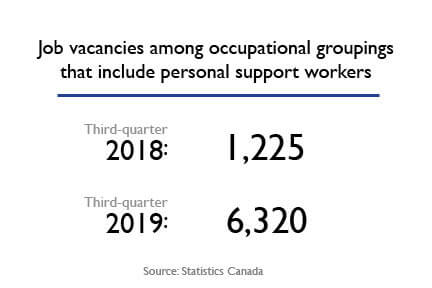Conestoga student J.J. Bowman won’t need to worry about landing a job after graduation.
That’s because she’s studying to be a personal support worker (PSW), a front-line health-care worker who assists the elderly, ill and disabled with their daily tasks.
An aging population and a shortage of PSWs have increased demand for people with her skillset.
“The job opportunities are a bonus,” she said as she took in a PSW career fair with a few classmates on Thursday.
Twenty-seven companies — mostly retirement homes, long-term care homes and community care groups — packed the Doon atrium to make their case to health and life sciences students.
“You’re pretty much guaranteed work,” said Stuart Oakley, communications and marketing manager for Caressant Care Nursing and Retirement Homes, as he manned a table filled with pamphlets.

Caressant Care operates 15 homes across the province. They are currently looking to hire as many as 10 full-time and around 13 part-time PSW positions at just one of their facilities in Fergus, Ont.
But vacancies aren’t always easy to fill.
A report released by the Ontario Health Coalition on Feb. 5 says the shortage of PSWs has reached “crisis” levels in the province. The shortage has led to poor working conditions, which has some people hunting for a different career.
“Long-term care homes reported that they are working with shortages of one to two PSWs on almost all shifts. This means that homes can be short five to 10 PSWs in every 24 hour period,” the report says.
“As a result of the shortages, long-term care homes are riskier and less safe places to live and work. … Shortages seem to breed more shortages.”
It also outlines other factors keeping potential recruits away:
- Low wages and lack of benefits compared to jobs that require similar skills.
- Long hours.
- High tuition costs.
- Increase in complexity of care of long-term care residents.
- Negative media coverage that stigmatizes PSW work.
Ian Da Silva, director of human resources for the Ontario Personal Support Workers Association, a group that represents 30,000 PSWs, says a lack of regulation could also be contributing to the shortage.

Unlike almost every other health care profession in the province, PSWs are unregulated. There is no government standard that determines the scope of their tasks.
“Once they graduate from college, they don’t have anyone to advocate for them,” said Da Silva.
“They are very much at the whim of whatever their employer says, which leads to uneven job satisfaction across the board. You either seem to have a bad employer or a good employer.”
Ontario’s health ministry considered regulating the industry in 2006 and again in 2010, but decided against it.
There are currently 150 students enrolled in the PSW and Supportive care program at Conestoga College, according to program chair Sarah Pottier.
She said that’s a slight dip from previous years, aligning with a province-wide trend, but she hopes that events like the career fair will turn that trend around and combat “inconsistent messaging” about the field.
“People are aware that it’s a challenging role — what brings people in is that they care,” said Pottier.
“We want to plant the seed in the program that ‘You can do this’, even amongst challenges.”

Conestoga College created Pottier’s role last year, after the urgent need for PSWs in the community was identified. Previously, the PSW and Supportive Care program did not have its own chair, as the position was integrated into another program.
The college has a number of options to ease the financial burden for PSW students, including tuition subsidies, bursaries and the opportunity to get paid while studying.

